8F2 Global Studies
Section outline
-
Welcome to 8F2 Global Studies! I am Mrs Lowden. We will have 3 Global Studies classes every week.
We will usually work together in F3. As this is our first class on Friday we will be organising our books and discussing some expectations and routines.
Then we will begin sharing information about ourselves by writing a letter. I've already written one to you. Looking forward to having a fabulous year with you.

-
Week 2
WALTs:
Set our books out using the correct format for the date and adding new material tidily.
Read for meaning and answer questions as evidence that we understood what we read.
Complete the first Reading Plus assessment task online
Accurately locate and mark locations on a NZ map
Discuss purpose of a pepeha.
Use the ‘Think, pair, share’ strategy to list items of significance for you and your family.
Select words/images to design a visual pepeha
Be ready to briefly share the meaning of your visual pepeha with the class/table group in week 3
-
Historical Events from NZ History
-
We are Kaitiakitanga of our environment.
WALTs
Form an opinion on the importance of being a Kaitiakitanga
Begin to identify the impact of past decisions on NZs kaimona and natural resources
Add to our knowledge and understanding of our impact on the environment
Use online resources to develop expectations and wonderings before our trip to a Marine Reserve (Goat Island)
-
We are Kaitiakitanga of our environment.
WALTs-Only 1 GLO this week on Wednesday
Add to your knowledge and understanding of our impact on the environment
Use online resources to develop expectations and wonderings before our trip to a Marine Reserve (Goat Island)
Trip Day is this Thursday!
Be a risk taker. Have a go at using a snorkel and flippers to explore a marine environment
Trip Day is this Thursday!
Be a risk taker. Have a go at using a snorkel and flippers to explore a marine environment.
-
WALTs
Use new, subject specific vocabulary (words) when discussing and recording our ideas on our topic
Identify and sort information into the following categories-Economic, Cultural, Recreational and Environmental
Form and share my opinion by recalling a shared experience, our trip to Goat island Marine Reserve, last week
Success Criteria
I can use new vocab appropriately when speaking or writing so that others can understand me
I can use new vocab appropriately in a way that demonstrates that I understand what these words/phrases mean
Home Learning
We are Global Citizens. We have a responsibility to be aware of the events and issues that impact our families here in New Zealand. We should also begin understanding, questioning and having an opinion about events that happen around the world as these often impact our country.
Ways to do this include: Watching the News on TV at 6pm most nights
Read Stuff, NZ Herald or Kiwi Kids News online
Look for opportunities to discuss current items with your family, classmates and friends.
What do they think?
Have they thought of other ideas that you haven't considered yet?
-
Is History important?
It happened in the past, it doesn't matter to us now.
Do you agree or disagree?
Can you give examples from NZ or World history to support your point of view?
WALTs
Read, write and take useful notes from a variety of sources
Answer different types of questions including:
- Questions that can be answered from the text
- Questions where I have to infer from the text or image by looking for clues
- Questions where I have to make connections with what I already know
- Questions where I am asked to form my own opinion
Success Criteria
I can participate in a group or whole class discussion using the facts I have learned to describe an event in chronological order (First this happened, then...Finally...)
I can use word, phrases and symbols to write useful notes that I can understand and use the next day or days after to help me plan a piece of writing
Home Learning
Current Events Quiz this Friday!
Use the sources of information we talked about last week to give yourself your best chance of scoring well on the quiz.
Challenge for experts: Find other sources of information, that are appropriate for a Year 8 audience, about the Tangiwai disaster.
-
Well, I won't see you this week as I am at camp with Year 7.
You will have a reliever for each Global Studies session this week.
All your activities are in Google Classroom so please check there.
Anything else you need, such as the School Journal or Atlases, are in the F3 cupboard.WALTs
We are learning to read for meaning by identifying new vocabulary (words) and ensuring we understand them
We are learning to write in our own words by:
Reading a text
Closing the text
Rewriting what we understood by using words we use in our everyday speech
We are using a reference source, such as an Atlas, to locate and/or confirm our knowledgeSuccess Criteria
Using the written text from the School Journal, group your ideas into 3 categories. The past, present and future.
Using a contents page, identify and use the best map in an Atlas to begin learning about the countries in our world and the regions within NZ
Home Learning
Are you in a routine yet? A routine makes it easier to maintain a new habit.
If you are in the habit of looking at Current Events each day you are more likely to do it again the next day and then the day after that too.
Remember you have choices about how you keep up with this task. Some people prefer listening the News on TV at 6pm each day. Some people prefer to read for themselves by going to Stuff, NZ Herald or Kiwi Kids News.
-
This week I will be checking in with you and reviewing all the tasks you were working on last week while I was at camp.
How did you get on?
Do we need more time to look at some tasks?Here's a checklist for us to use to remind us of the expectations from last week.
Tasks
- I completed and submitted the Current Events Task
- I read the School Journal text on Marine Reserves
- I completed the writing task about Marine Reserves
- I tried out the World Map quiz online
- I used the Atlas to neatly label the 7 continents and 5 oceans on a word map
- I read the School Journal text about Rahui
- I completed the short writing task explaining what a Rahui is
- I used the Atlas to label the regions of NZ and and the water between our main islands
WALT
Read for understanding
Use an Atlas to help us locate information
Label a map neatly and accurately so that others can read it and use it
Home Learning
Continue reading, listening and discussing current events with others
-

Easter is coming! We only have two Global Studies sessions this week. Friday is the beginning of the Easter holiday break. We will not be at school this Friday.
This week we are building on our mapping knowledge of the World.
We have used the Atlas over the last 2 weeks to label some maps.
This week we have a new challenge. We are using the Atlas to help us make a map!
WALTs
We are learning to identify the continents by their shape in order to build our own world map
We are learning to identify and label:
- 7 continents
- 5 oceans
- Equator
- Tropic of Capricorn
- Tropic of Cancer
We are learning to collaborate as a group by locating and discussing which countries are above/on/below the equator
Success Criteria
Make a neat, accurately labelled map of the World that has a frame and includes:
- 7 continents
- 5 oceans
- Equator
- Tropic of Capricorn
- Tropic of Cancer
Complete Equator Sorting activity to demonstrate understanding of what climate a country is likely to have if it is above/on/below the equator
Home Learning
Keep up to date with your Current Events. There is another Friday quiz coming....
-
This week we will continue to look at maps but we will be adding a new skill-Using a compass.
WALTs
We are learning to accurately recall the ordinal and cardinal compass points
Recall new learning from the previous 2 weeks
Success Criteria
Make an accurate representation of a compass
Use a compass to give and/or understand direction on a map
Challenge yourself: Review your knowledge of the continents and oceans by labelling them on a paper map WITHOUT referring to a device or Atlas
Complete an online Current Events challenge (in Google Classroom)
-
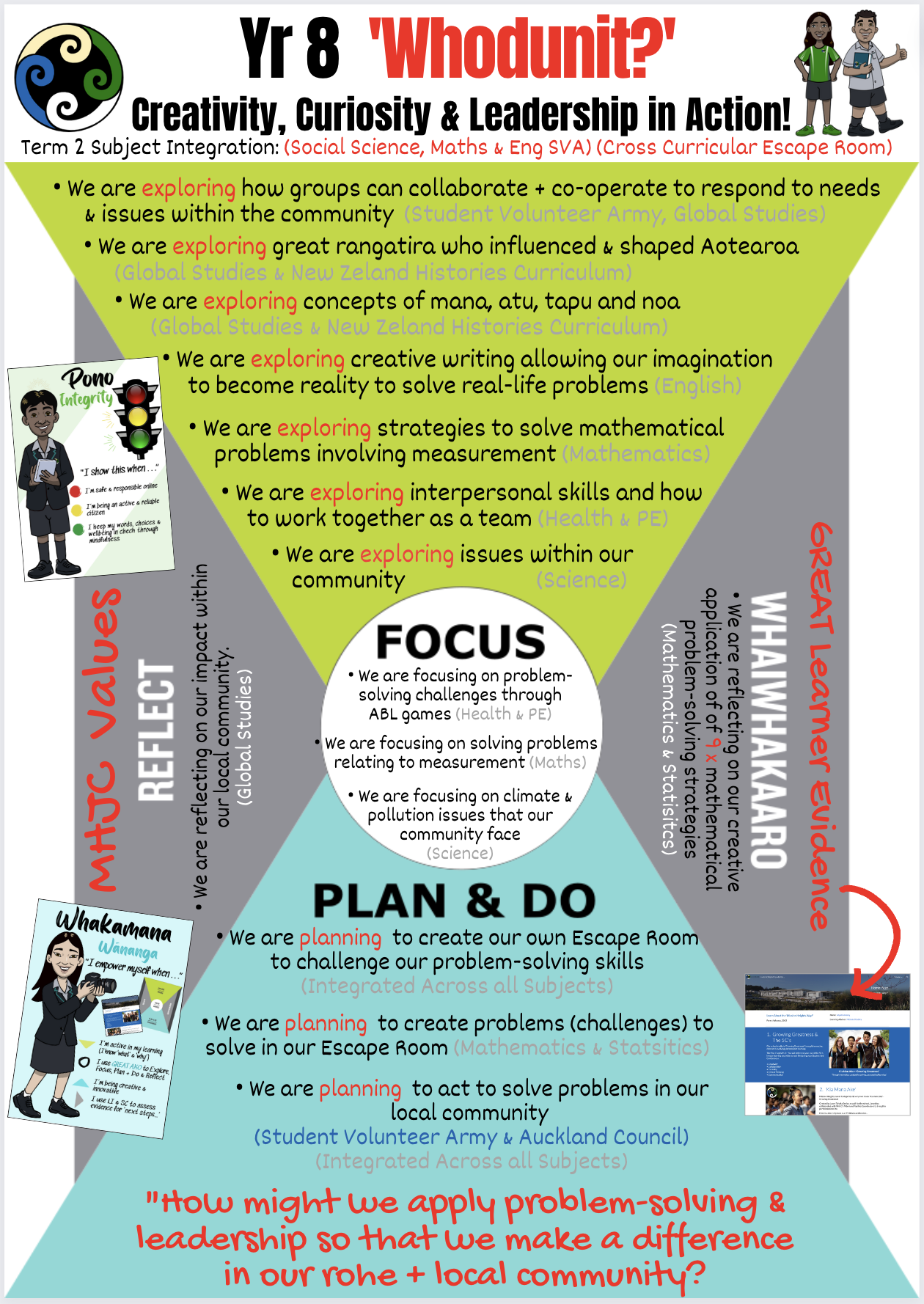
Kia ora! This week we are exploring the story of a great rangatira.
EXPLORE / TŪHURA learning intentions:
- We are EXPLORING people’s values, viewpoints, and perspectives, including my own
- We are EXPLORING how language and messaging can be used to inform, to misinform, and to position people alongside particular values and perspectives.
- We are EXPLORING relationships between events and identify continuity or changes in relationships.
- We are EXPLORING people’s actions in the past based on historical evidence and taking account of the attitudes and values of the times,
the challenges people faced, and the information available to them.
Authentic Outcomes: ‘Escape Room Challenge’
Theme: Resilience/empowerment/perseverance
Whakatauki: "I orea te tuatara ka patu ki waho."
Metaphorical: A problem is solved by continuing to find solutions
Literal: This whakatauki refers to the need for creative thinking, adaptability and perseverance. In order to solve a problem you need to have all of these.
Paearu Angitu (Success Criteria): I can...
• Locate information in a text
• Define key terms
• Examine values, viewpoints, and perspectivesHei Mahi (Activities):
2. In pairs, read the journal article: 'Eruera Maihi Patuone: The Story of a Great Rangatirau' attached as a pdf, below.
1. Eruera Maihi Patuone lived to be 108 (some say he was 112). Over his long life, he would witness enormous change. Patuone was a boy when Captain Cook first arrived, and he was one of the first rangatira to sign Te Tiriti o Waitangi. As a warrior, he fought with both traditional weapons and muskets. Later in life, he became a peacemaker. Like his cousin Hongi Hika, Patuone was a descendant of Rāhiri, who in turn descended from Kupe.
3. Discuss the Key Terms: ancestral wisdom, biography, Captain Cook, heritage, leadership, Musket Wars, New Zealand Wars, Northern War, power, rangatira, rangatiratanga.
4. In exercise books, write the short date, heading and full answers to a). Quick Find, b). Reading between the lines, and c). '50 Words'.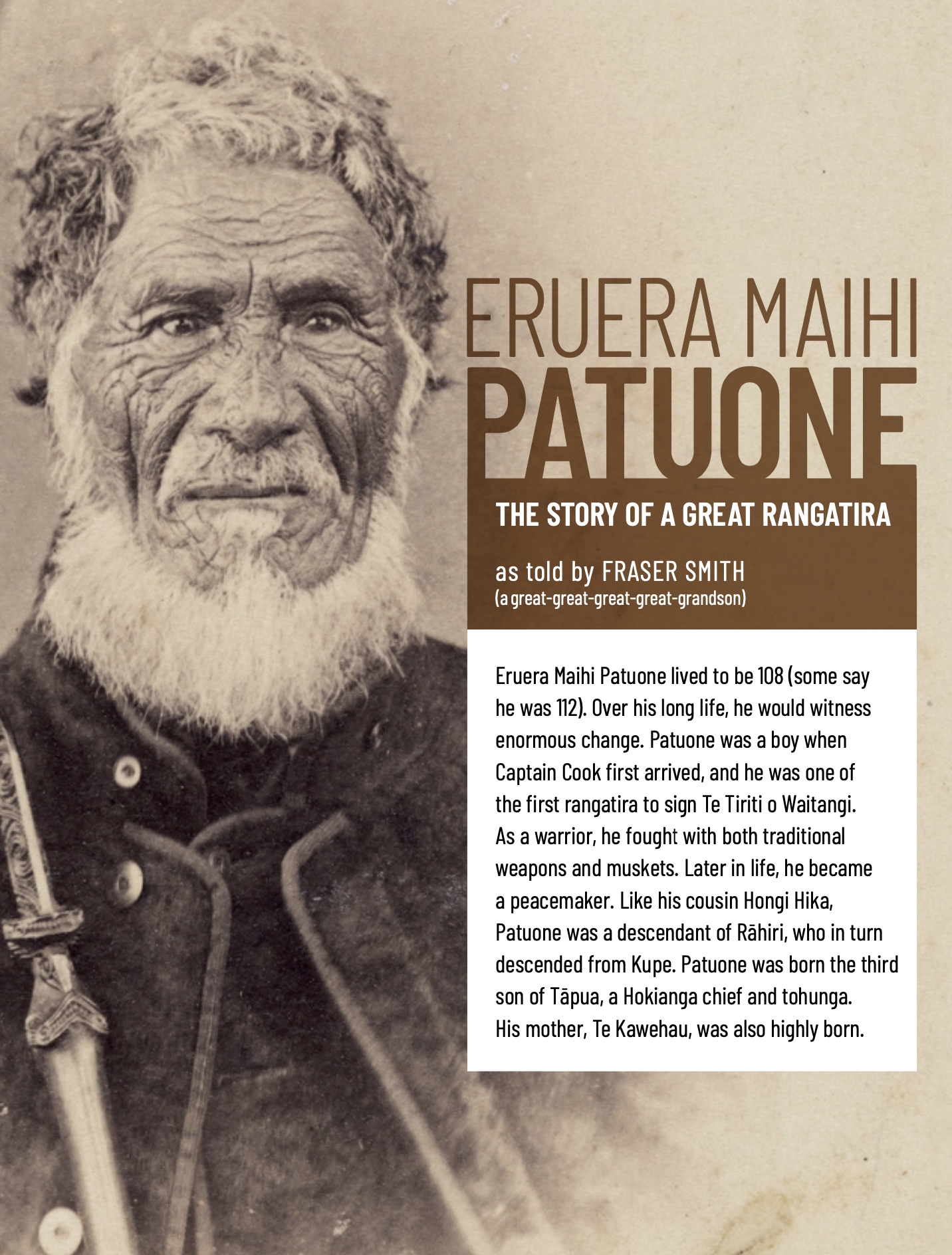

-
Kia ora! This week we are exploring the story of one of the first Maori suffragists, Meri Te Tai Mangakahia. Meri Te Tai made an enormous contribution to advancing women's equality in Aotearoa through the women's suffrage movement, and more. Well ahead of her time, Meri Te Tai Mangakahia wanted more than the right to vote, she wanted women represented in Parliament to be part of the decision-making.
EXPLORE / TŪHURA learning intentions:
- We are EXPLORING people’s values, viewpoints, and perspectives, including my own
- We are EXPLORING how language and messaging can be used to inform, to misinform, and to position people alongside particular values and perspectives.
- We are EXPLORING relationships between events and identify continuity or changes in relationships.
- We are EXPLORING people’s actions in the past based on historical evidence and taking account of the attitudes and values of the times,
the challenges people faced, and the information available to them.
Authentic Outcomes: ‘Escape Room Challenge’
Theme: Resilience/empowerment/perseverance
Whakatauki: "I orea te tuatara ka patu ki waho."
Metaphorical: A problem is solved by continuing to find solutions
Literal: This whakatauki refers to the need for creative thinking, adaptability and perseverance. In order to solve a problem you need to have all of these.
Paearu Angitu (Success Criteria): I can...
• Locate information in a text
• Define key terms
• Examine values, viewpoints, and perspectives
• Construct a timeline to display a mana-enhancing event/s (leadership, change & economic relationships)Hei Mahi (Activities):
a). Words from Meri Te Tai Mangakāhia: Māori Suffragist
1. Complete Term 2, Week 2's General Knowledge Quiz.
2. Read the two short extracts below on Meri Te Tai Mangakahia one of New Zealand's first Maori suffragists.
b). Kia Kaha profile - Meri Te Tai Mangakāhia
3. Complete the following Cloze learning activity about Meri Te Tai Mangakahia on Google Classroom by inserting the appropriate key word from the word bank onto the document (Google Classroom).
4. Craft a timeline of Meri Te Tai Mangakahia's life and achievements on Canva. The Te Ara Encyclopaedia will prove to be a useful start to your research of key dates & events: Te Ara - Encyclopaedia of NZ - Meri Te Tai Mangakāhia
5. Special Guests: Listen to Meri Te Tai Mangakahia's great grand niece Emma Frost (radio interview) with descendants Jeremy Adams & Daymon Adams. Discuss values, viewpoints, and perspectives of land loss, and Māori women’s ownership and control of land was one reason why they needed to take part in discussion, decision-making and leadership. Discuss how people’s actions in the past based on historical evidence and taking account of the attitudes and values of the times, the challenges people faced, and the information available to them and how language and messaging can be used to inform, to misinform, and to position people alongside particular values and perspectives.
Revisit your timeline to ensure your have captured Meri Te Tai Mangakahia's values, viewpoints, challenges and perspectives.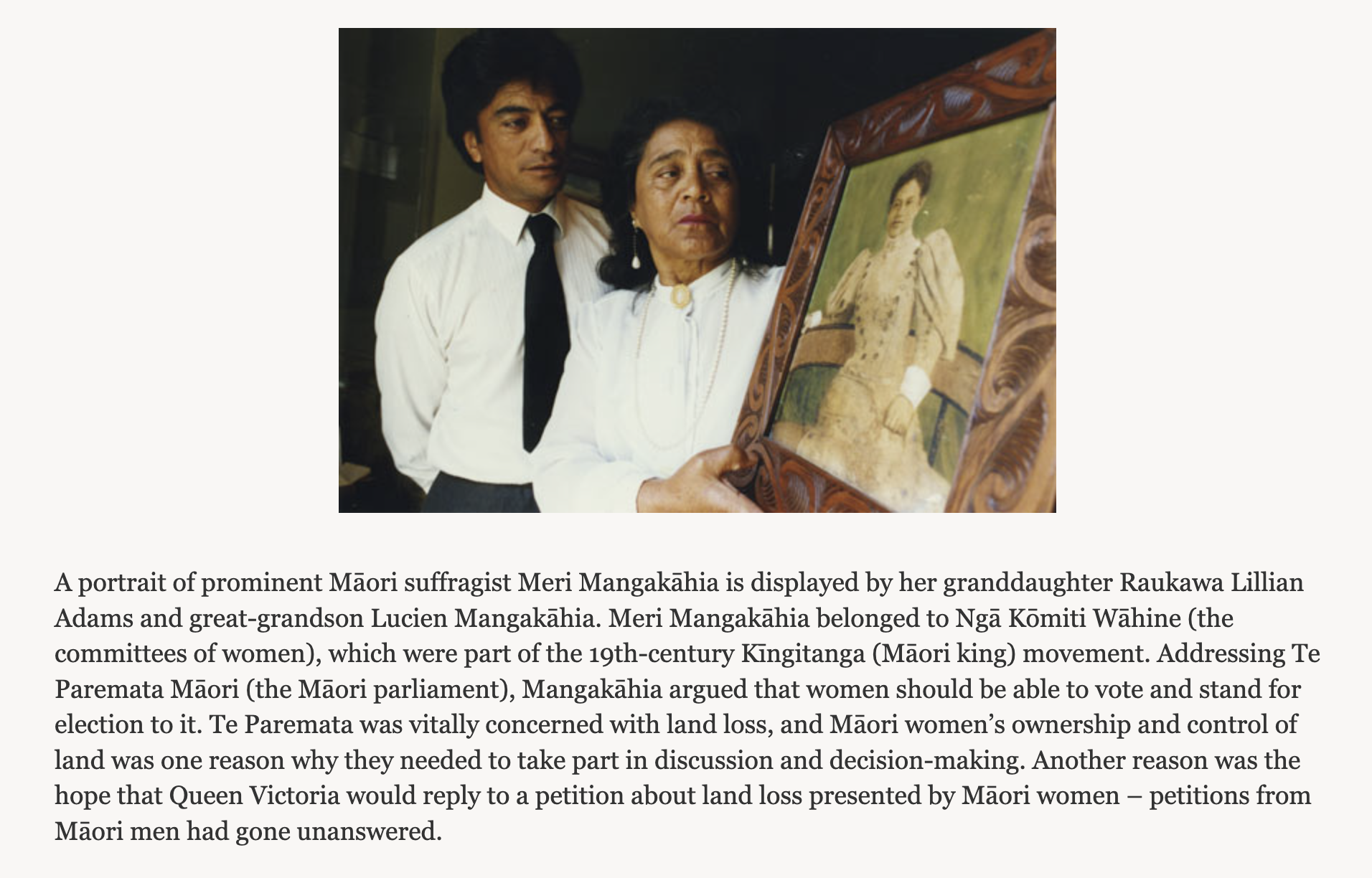

-
Kia ora! This week we are exploring the story of Hakaraia. He was once the most prominent Māori leader in the Bay of Plenty.
EXPLORE / TŪHURA learning intentions:
- We are EXPLORING people’s values, viewpoints, and perspectives, including my own
- We are EXPLORING how language and messaging can be used to inform, to misinform, and to position people alongside particular values and perspectives.
- We are EXPLORING relationships between events and identify continuity or changes in relationships.
- We are EXPLORING people’s actions in the past based on historical evidence and taking account of the attitudes and values of the times,
the challenges people faced, and the information available to them.
Authentic Outcomes: ‘Escape Room Challenge’
Theme: Resilience/empowerment/perseverance
Whakatauki: "I orea te tuatara ka patu ki waho."
Metaphorical: A problem is solved by continuing to find solutions
Literal: This whakatauki refers to the need for creative thinking, adaptability and perseverance. In order to solve a problem you need to have all of these.
Paearu Angitu (Success Criteria): I can...
• Locate information in a text
• Define key terms
• Examine values, viewpoints, and perspectives
• Construct a timeline to display a mana-enhancing event/s (leadership, change & economic relationships)
• Summarise key ideasHei Mahi (Activities):
1. Complete Term 2, Week 2's General Knowledge Quiz.
2. Read the journal article: 'Hakaraia: Warrior Peacemaker' attached as a pdf, below.
3. In exercise books, write the short date, heading and full answers.
4. Participate in class marking, with the Teacher.
5. Map Work
- Complete the map by filling in the missing names that you can find at the bottom of the page.
- Use different colours to display Hakaraia's journey.
- Mention important events of Hakaraia's life while drawing his travel trail. -
EXPLORE / TŪHURA learning intentions:
- We are EXPLORING people’s values, viewpoints, and perspectives, including my own
- We are EXPLORING how language and messaging can be used to inform, to misinform, and to position people alongside particular values and perspectives.
- We are EXPLORING relationships between events and identify continuity or changes in relationships.
- We are EXPLORING people’s actions in the past based on historical evidence and taking account of the attitudes and values of the times,
the challenges people faced, and the information available to them.
Authentic Outcomes: ‘Escape Room Challenge’
Theme: Resilience/empowerment/perseverance
Whakatauki: "I orea te tuatara ka patu ki waho."
Metaphorical: A problem is solved by continuing to find solutions
Literal: This whakatauki refers to the need for creative thinking, adaptability and perseverance. In order to solve a problem you need to have all of these.
Paearu Angitu (Success Criteria): I can...
• Locate information in a text
• Define key terms
• Examine values, viewpoints, and perspectives
• Construct a timeline to display a mana-enhancing event/s (leadership, change & economic relationships)
• Summarise key ideasHei Mahi (Activities):
This week, our focus is on exploring and identifying the needs and issues within our community. We will also consider how we, as a group, can respond to these needs.
1. Complete Term 2, Week 4's General Knowledge Quiz.
2. Classroom discussion.
3. Think about some of the environmental problems we are facing in our local community and at MHJC.
4. Create a reflective document (Google Docs/Google Sheets), including the following points:
a. 3 environmental issues world/New Zealand is facing. Read this article for more information : https://earth.org/the-biggest-environmental-problems-of-our-lifetime/
b. Environmental issue local community is facing (MHJC and surrounding areas).
c. What we (as a group) and I can do to address and resolve/reduce this issue. Suggest 3-5 suggestions.
d. Complete 'Fish Bone diagram'.
5. Submit your document on Google Classroom.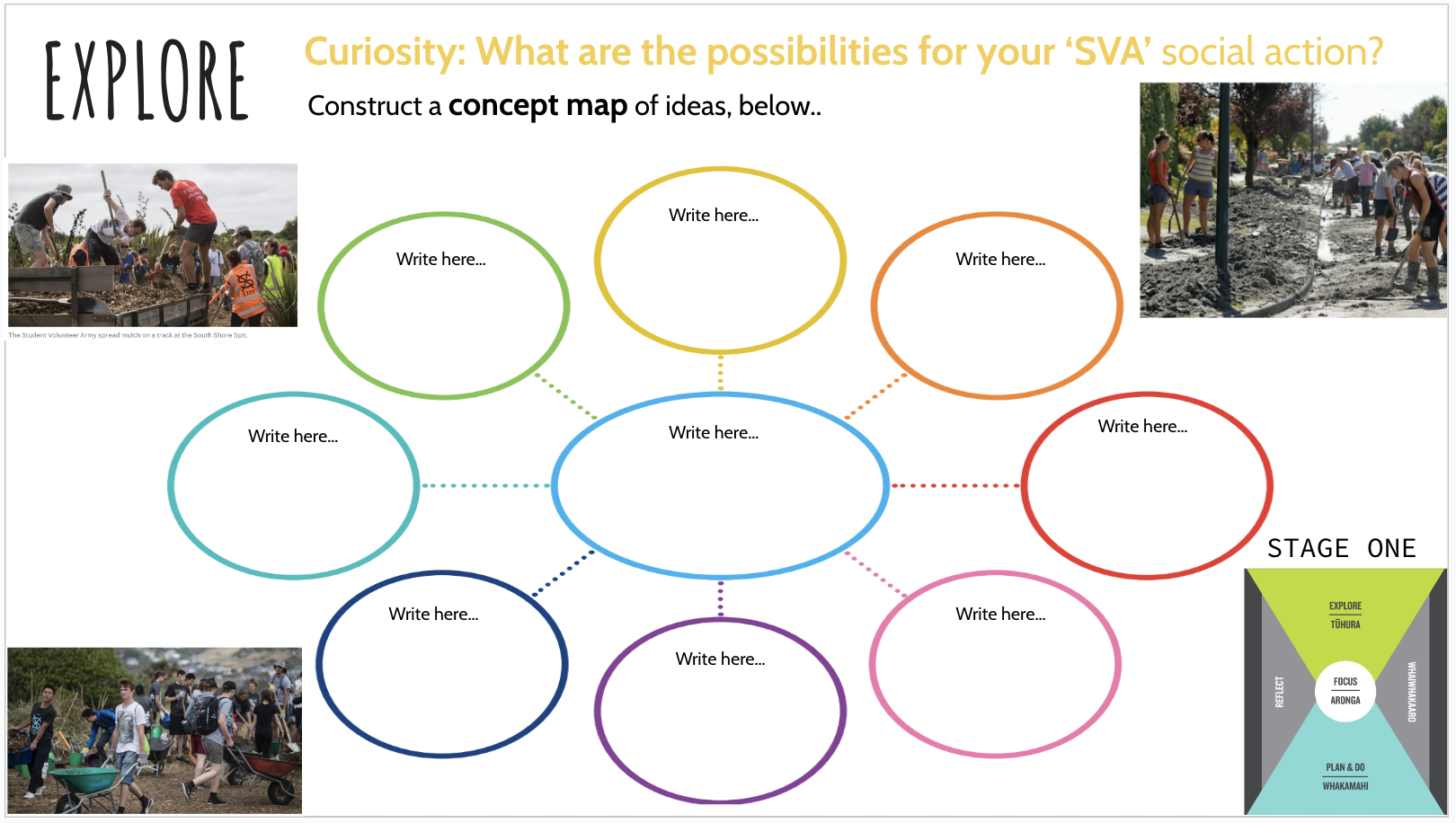
-
EXPLORE / TŪHURA learning intentions:
- We are EXPLORING people’s values, viewpoints, and perspectives, including my own
- We are EXPLORING how language and messaging can be used to inform, to misinform, and to position people alongside particular values and perspectives.
- We are EXPLORING relationships between events and identify continuity or changes in relationships.
- We are EXPLORING people’s actions in the past based on historical evidence and taking account of the attitudes and values of the times,
the challenges people faced, and the information available to them.
Authentic Outcomes: ‘Escape Room Challenge’
Theme: Resilience/empowerment/perseverance
Whakatauki: "I orea te tuatara ka patu ki waho."
Metaphorical: A problem is solved by continuing to find solutions
Literal: This whakatauki refers to the need for creative thinking, adaptability and perseverance. In order to solve a problem you need to have all of these.
Paearu Angitu (Success Criteria): I can...
• Locate information in a text
• Define key terms
• Examine values, viewpoints, and perspectives
• Work on different thinking and learning strategies.
• Summarise key ideasHei Mahi (Activities):
This week, we are going to explore the Student Volunteer Army (SVA). I will share the information about this initiative, and then we will start preparing for our army and the actions we will execute for our community. While working on this activity, you will be able to obtain evidence for your ‘Great Learner Graduate Profile’ and a Citizenship eBadge.
1. Complete Term 2, Week 4's General Knowledge Quiz.
2. Classroom discussion.
3. Complete the SVA document
5. Submit your document on Google Classroom.

-
EXPLORE / TŪHURA learning intentions:
- We are EXPLORING people’s values, viewpoints, and perspectives, including my own
- We are EXPLORING how language and messaging can be used to inform, to misinform, and to position people alongside particular values and perspectives.
- We are EXPLORING relationships between events and identify continuity or changes in relationships.
- We are EXPLORING people’s actions in the past based on historical evidence and taking account of the attitudes and values of the times,
the challenges people faced, and the information available to them.
Authentic Outcomes: ‘Escape Room Challenge’
Theme: Resilience/empowerment/perseverance
Whakatauki: "I orea te tuatara ka patu ki waho."
Metaphorical: A problem is solved by continuing to find solutions
Literal: This whakatauki refers to the need for creative thinking, adaptability and perseverance. In order to solve a problem you need to have all of these.
Paearu Angitu (Success Criteria): I can...
• Locate information in a text
• Define key terms
• Examine values, viewpoints, and perspectives
• Work on different thinking and learning strategies.
• Summarise key ideasHei Mahi (Activities):
This week, we will work on uploading the evidence on holistic report and continue working on SVA.
Session 1: Upload evidence on your site.
1. Complete Term 2, Week 4's General Knowledge Quiz.
Session 2: Student Volunteer Army - Plan & Do.
2. Classroom discussion.
3. Take a screenshot of all three strategies and create one document.
4. Upload the document and complete writing about your evidence.

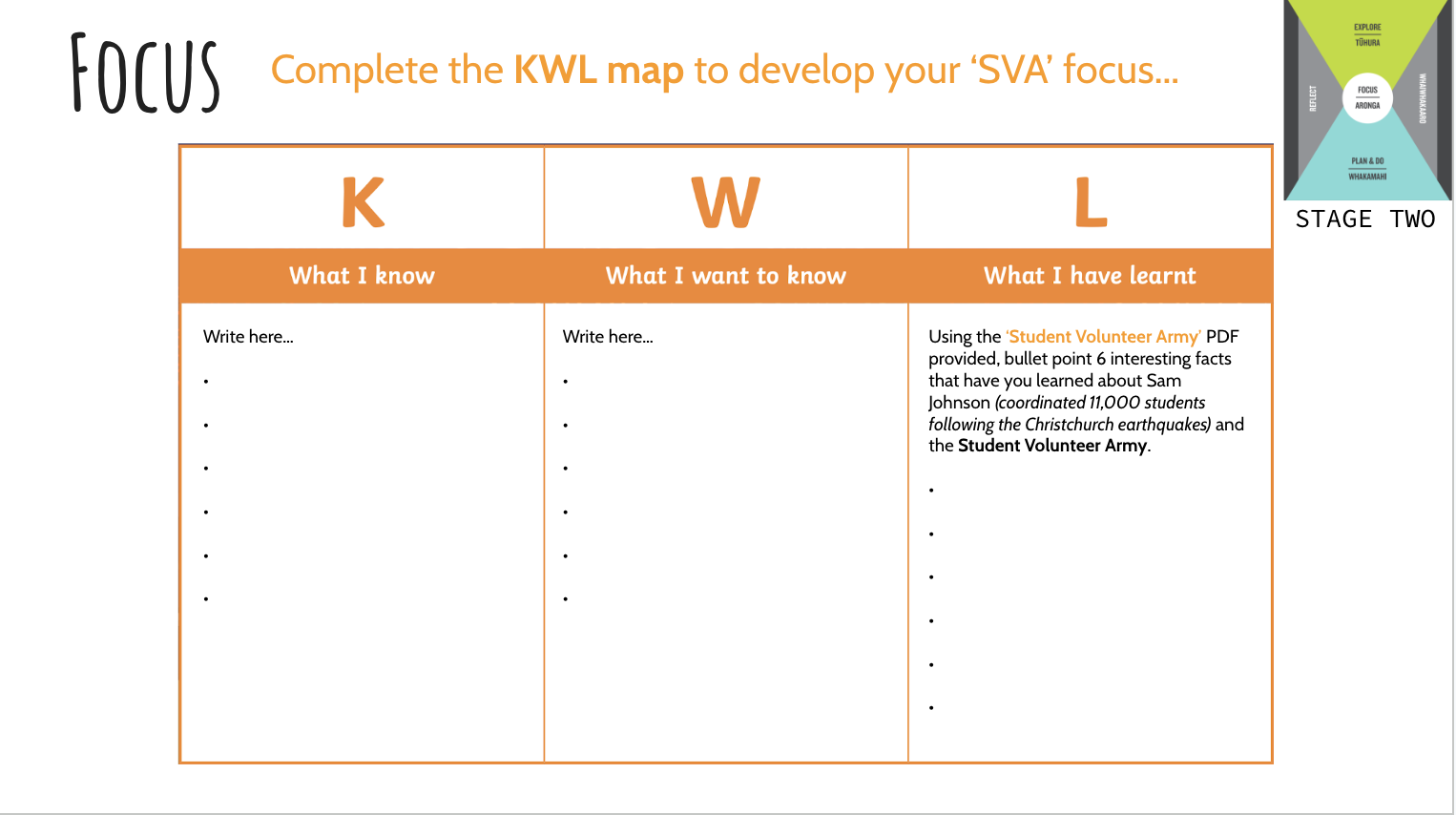
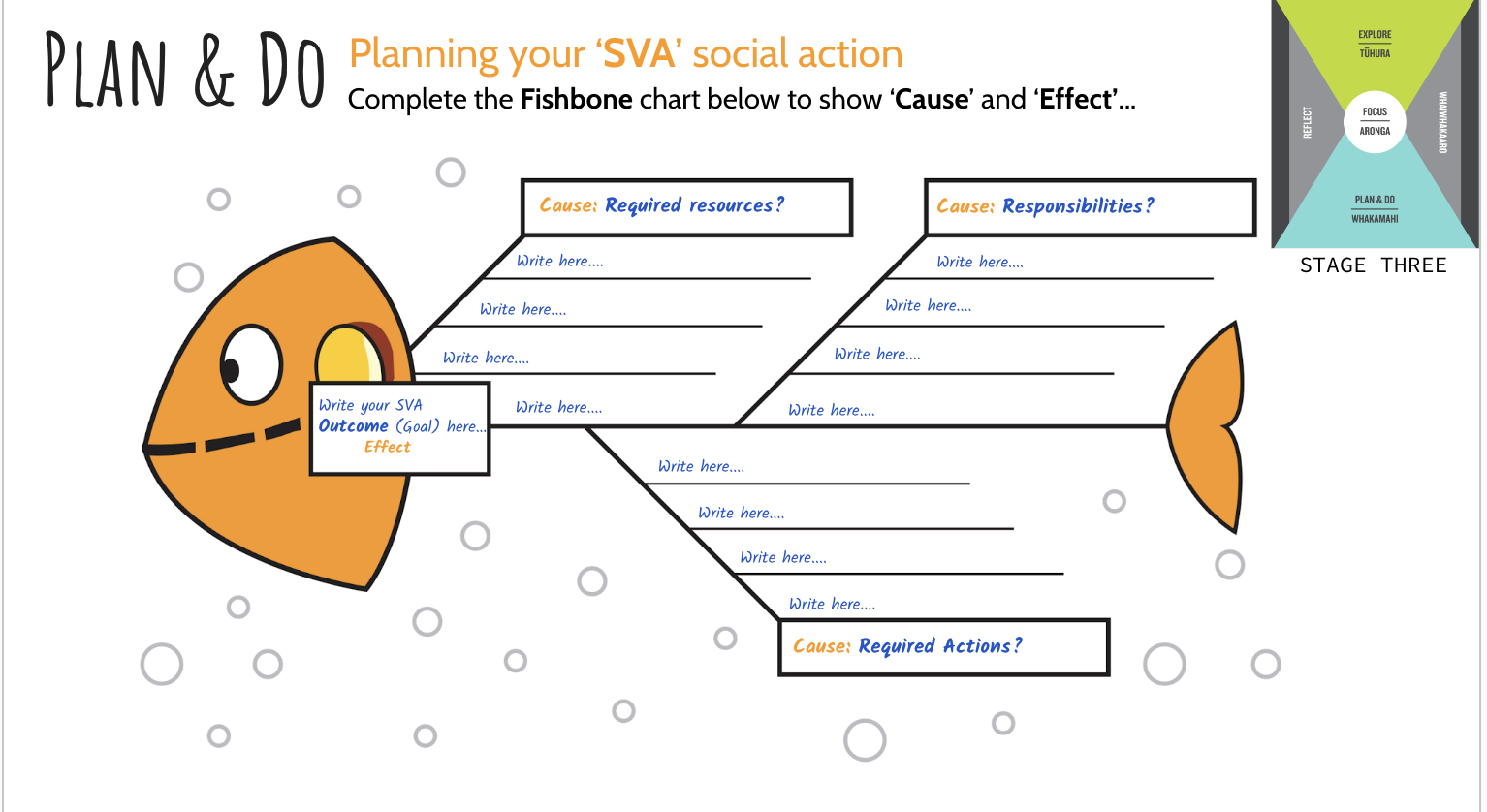
-
EXPLORE / TŪHURA learning intentions:
- We are EXPLORING people’s values, viewpoints, and perspectives, including my own
- We are EXPLORING how language and messaging can be used to inform, to misinform, and to position people alongside particular values and perspectives.
- We are EXPLORING relationships between events and identify continuity or changes in relationships.
- We are EXPLORING people’s actions in the past based on historical evidence and taking account of the attitudes and values of the times,
the challenges people faced, and the information available to them.
Authentic Outcomes: ‘Escape Room Challenge’
Theme: Resilience/empowerment/perseverance
Whakatauki: "I orea te tuatara ka patu ki waho."
Metaphorical: A problem is solved by continuing to find solutions
Literal: This whakatauki refers to the need for creative thinking, adaptability and perseverance. In order to solve a problem you need to have all of these.
Paearu Angitu (Success Criteria): I can...
• Locate information in a text
• Define key terms
• Examine values, viewpoints, and perspectives
• Work on different thinking and learning strategies.
• Summarise key ideasHei Mahi (Activities):
This week, we will work on our first Global Assessment. I will explain it to you before we will start working on it. This assessment is due in Term 2, Week 9. Enjoy and do your best.
1. Complete Term 2, Week 7's General Knowledge Quiz.
2. Classroom discussion.
3. After teacher's explanation, start working on your assessment.
4. Read the 'Marking Rubric' carefully.
-
EXPLORE / TŪHURA learning intentions:
- We are EXPLORING people’s values, viewpoints, and perspectives, including my own
- We are EXPLORING how language and messaging can be used to inform, to misinform, and to position people alongside particular values and perspectives.
- We are EXPLORING relationships between events and identify continuity or changes in relationships.
- We are EXPLORING people’s actions in the past based on historical evidence and taking account of the attitudes and values of the times,
the challenges people faced, and the information available to them.
Authentic Outcomes: ‘Escape Room Challenge’
Theme: Resilience/empowerment/perseverance
Whakatauki: "I orea te tuatara ka patu ki waho."
Metaphorical: A problem is solved by continuing to find solutions
Literal: This whakatauki refers to the need for creative thinking, adaptability and perseverance. In order to solve a problem you need to have all of these.
Paearu Angitu (Success Criteria): I can...
• Locate information in a text
• Define key terms
• Examine values, viewpoints, and perspectives
• Work on different thinking and learning strategies.
• Summarise key ideasHei Mahi (Activities):
This week, we will continue working on assessment. We will also explore the Aotearoa history timeline and mana in Māori history and society.
Session 1: Assessment and Learner evidence.
Sessions 2 & 3: Mana in Māori history & society.
1. Complete Term 2, Week 7's General Knowledge Quiz.
2. Classroom discussion.
3. After teacher's explanation, start working on the activity.
4. Read the 'Marking Rubric' carefully and check the assessment outcome before submitting.
-
EXPLORE / TŪHURA learning intentions:
- We are EXPLORING people’s values, viewpoints, and perspectives, including my own
- We are EXPLORING how language and messaging can be used to inform, to misinform, and to position people alongside particular values and perspectives.
- We are EXPLORING relationships between events and identify continuity or changes in relationships.
- We are EXPLORING people’s actions in the past based on historical evidence and taking account of the attitudes and values of the times,
the challenges people faced, and the information available to them.
Authentic Outcomes: ‘Escape Room Challenge’
Theme: Resilience/empowerment/perseverance
Whakatauki: "I orea te tuatara ka patu ki waho."
Metaphorical: A problem is solved by continuing to find solutions
Literal: This whakatauki refers to the need for creative thinking, adaptability and perseverance. In order to solve a problem you need to have all of these.
Paearu Angitu (Success Criteria): I can...
• Locate information in a text
• Define key terms
• Examine values, viewpoints, and perspectives
• Work on different thinking and learning strategies.
• Summarise key ideasHei Mahi (Activities):
This week, we will continue working on assessment.
Session 1: SVA activity - Kaitiakitanga Day maintenance of our native plants
Sessions 2 : Assessment
1. Complete Term 2, Week 9's General Knowledge Quiz.
2. SVA activity - Kaitiakitanga Day maintenance of our native plants
3. After teacher's explanation, start working on the activity.
4. Read the 'Marking Rubric' carefully and check the assessment outcome before submitting.
-
Opened: Friday, 7 June 2024, 2:30 PMDue: Saturday, 29 June 2024, 4:30 PM
-
EXPLORE / TŪHURA learning intentions:
- We are EXPLORING people’s values, viewpoints, and perspectives, including my own
- We are EXPLORING how language and messaging can be used to inform, to misinform, and to position people alongside particular values and perspectives.
- We are EXPLORING relationships between events and identify continuity or changes in relationships.
- We are EXPLORING people’s actions in the past based on historical evidence and taking account of the attitudes and values of the times,
the challenges people faced, and the information available to them.
Authentic Outcomes: ‘Escape Room Challenge’
Theme: Resilience/empowerment/perseverance
Whakatauki: "I orea te tuatara ka patu ki waho."
Metaphorical: A problem is solved by continuing to find solutions
Literal: This whakatauki refers to the need for creative thinking, adaptability and perseverance. In order to solve a problem you need to have all of these.
Paearu Angitu (Success Criteria): I can...
• Locate information in a text
• Define key terms
• Examine values, viewpoints, and perspectives
• Work on different thinking and learning strategies.
• Summarise key ideasHei Mahi (Activities):
This week, we will reflect on our SVA actions and complete the slides. After this, we will work on an escape room clue activity.
Session 1: SVA activity - Kaitiakitanga Day maintenance of our native plants - Reflection.
1. Complete Term 2, Week 10's General Knowledge Quiz.
Session 2: Escape room activity
Session 3: Matariki reading activity.
2. SVA activity - Kaitiakitanga Day maintenance of our native plants - Complete slides 7, 8, 9 & 10.
3. After teacher's explanation, start working on the activity.
REFLECT / WHAIWHAKAARO learning intentions:
- We are REFLECTING on our impact within our local community.
-
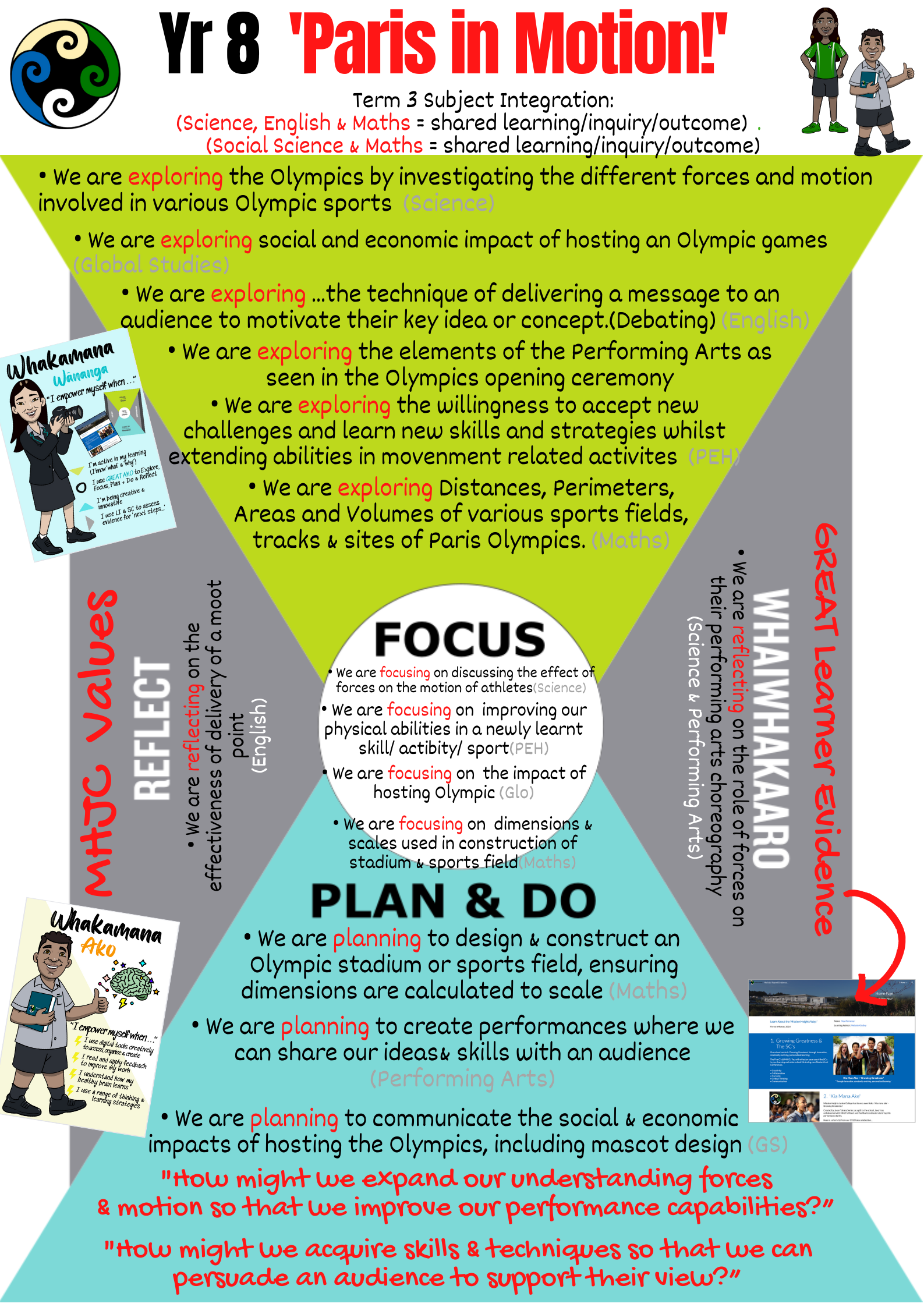
EXPLORE / TŪHURA learning intentions:
- We are EXPLORING the economic and social impact on host cities.
- We are EXPLORING opportunities and challenges for people, places, and environments.
- We are UNDERSTANDING that events have causes and effects.
- We are EXPLORING and learning to collect, analyse and use sources.
Authentic Outcomes: • To communicate the social & economic impacts of hosting an Olympics, including mascot design, etc.
Theme: Seek out your heart's desires.
Whakatauki:"Whāia te iti kahurangi, ki te tuohu koe me maunga teitei"
Metaphorical: Seek out your heart's desire, though if you have to relent, let it be to a lofty mountain.
Literal: This whakatauki (proverb) speaks to the importance of aiming high and being persistent and tenacious about reaching your goal/s.
Paearu Angitu (Success Criteria): I can...
• Collect and analyse the sources.
• Identify and understand the economic and social impact of hosting a big event.
• Examine the cause and effect theory.
• Work on different thinking and learning strategies.
• Summarise key ideasHei Mahi (Activities):
Kia ora everyone,
Welcome back! This term, we will focus on the social and economic impacts of hosting the Olympics. We will understand this by focusing on the host cities and countries.
Session 1: Introduction to the Olympics, Comprehension Activity.
Session 2: Opening Ceremonies Journey - Create a chart of the host nations and years, how each host country represents their cultures, values, and national identity. Identify three positive and negative points. How New Zealand might represent itself in an opening ceremony. What aspects of our culture, values, and national identity could we highlight?Session 3: Weekly quiz, continuing with the activity.
-

EXPLORE / TŪHURA learning intentions:
- We are EXPLORING the economic and social issues.
- We are EXPLORING the economic and social impact on host cities.
- We are EXPLORING opportunities and challenges for people, places, and environments.
- We are UNDERSTANDING that events have causes and effects.
- We are EXPLORING and learning to collect, analyse and use sources.
Authentic Outcomes: • To communicate the social & economic impacts of hosting an Olympics, including mascot design, etc.
Theme: Seek out your heart's desires.
Whakatauki:"Whāia te iti kahurangi, ki te tuohu koe me maunga teitei"
Metaphorical: Seek out your heart's desire, though if you have to relent, let it be to a lofty mountain.
Literal: This whakatauki (proverb) speaks to the importance of aiming high and being persistent and tenacious about reaching your goal/s.
Paearu Angitu (Success Criteria): I can...
• Collect and analyse the sources.
• Identify and understand the economic and social impact of hosting a big event.
• Examine the cause and effect theory.
• Work on different thinking and learning strategies.
• Summarise key ideasHei Mahi (Activities):
Kia ora everyone,
Welcome back! This term, we will focus on the social and economic impacts of hosting the Olympics. We will understand this by focusing on the host cities and countries.
Session 1: Introduction, Economic issues and economic benefits of hosting an event - The Olympics.
Session 2: Group activity - Economic issues and benefits - choose an Olympic host country from the past
Session 3: Weekly quiz - Presenting the slides.
-

EXPLORE / TŪHURA learning intentions:
- We are EXPLORING the economic and social issues.
- We are EXPLORING the economic and social impact on host cities.
- We are EXPLORING opportunities and challenges for people, places, and environments.
- We are UNDERSTANDING that events have causes and effects.
- We are EXPLORING and learning to collect, analyse and use sources.
Authentic Outcomes: • To communicate the social & economic impacts of hosting an Olympics, including mascot design, etc.
Theme: Seek out your heart's desires.
Whakatauki:"Whāia te iti kahurangi, ki te tuohu koe me maunga teitei"
Metaphorical: Seek out your heart's desire, though if you have to relent, let it be to a lofty mountain.
Literal: This whakatauki (proverb) speaks to the importance of aiming high and being persistent and tenacious about reaching your goal/s.
Paearu Angitu (Success Criteria): I can...
• Collect and analyse the sources.
• Identify and understand the economic and social impact of hosting a big event.
• Examine the cause and effect theory.
• Work on different thinking and learning strategies.
• Summarise key ideasHei Mahi (Activities):
Kia ora everyone,
Welcome back! This term, we will focus on the social and economic impacts of hosting the Olympics. We will understand this by focusing on the host cities and countries.
Session 1: Presentation Time - Economic Issues
Session 2: Presentation Time - Economic Issues
Session 3: Weekly quiz & The Economic Impacts of Hosting the Olympic Games - Task
-

EXPLORE / TŪHURA learning intentions:
- We are EXPLORING the economic and social issues.
- We are EXPLORING the economic and social impact on host cities.
- We are EXPLORING opportunities and challenges for people, places, and environments.
- We are UNDERSTANDING that events have causes and effects.
- We are EXPLORING and learning to collect, analyse and use sources.
Authentic Outcomes: • To communicate the social & economic impacts of hosting an Olympics, including mascot design, etc.
Theme: Seek out your heart's desires.
Whakatauki:"Whāia te iti kahurangi, ki te tuohu koe me maunga teitei"
Metaphorical: Seek out your heart's desire, though if you have to relent, let it be to a lofty mountain.
Literal: This whakatauki (proverb) speaks to the importance of aiming high and being persistent and tenacious about reaching your goal/s.
Paearu Angitu (Success Criteria): I can...
• Collect and analyse the sources.
• Identify and understand the economic and social impact of hosting a big event.
• Examine the cause and effect theory.
• Work on different thinking and learning strategies.
• Summarise key ideasHei Mahi (Activities):
Kia ora everyone,
Welcome back! This term, we will focus on the social and economic impacts of hosting the Olympics. We will understand this by focusing on the host cities and countries.
Session 1: The Economic Impacts of Hosting the Olympic Games - Discussion and complete the task.
Session 2: Social Issues - Introduction and related task
Session 3: Weekly quiz & Social Impacts of Hosting the Olympic Games
-

EXPLORE / TŪHURA learning intentions:
- We are EXPLORING the economic and social issues.
- We are EXPLORING the economic and social impact on host cities.
- We are EXPLORING opportunities and challenges for people, places, and environments.
- We are UNDERSTANDING that events have causes and effects.
- We are EXPLORING and learning to collect, analyse and use sources.
Authentic Outcomes: • To communicate the social & economic impacts of hosting an Olympics, including mascot design, etc.
Theme: Seek out your heart's desires.
Whakatauki:"Whāia te iti kahurangi, ki te tuohu koe me maunga teitei"
Metaphorical: Seek out your heart's desire, though if you have to relent, let it be to a lofty mountain.
Literal: This whakatauki (proverb) speaks to the importance of aiming high and being persistent and tenacious about reaching your goal/s.
Paearu Angitu (Success Criteria): I can...
• Collect and analyse the sources.
• Identify and understand the economic and social impact of hosting a big event.
• Examine the cause and effect theory.
• Work on different thinking and learning strategies.
• Summarise key ideasHei Mahi (Activities):
Kia ora everyone,
This term, we will focus on the social and economic impacts of hosting the Olympics. We will understand this by focusing on the host cities and countries.
Session 1: Presentation of the posters - Social impacts of hosting the Olympic Games.
Session 2: Learner Evidence.
Session 3: Weekly quiz & Introduction - Assessment 2.
-

EXPLORE / TŪHURA learning intentions:
- We are EXPLORING the economic and social issues.
- We are EXPLORING the economic and social impact on host cities.
- We are EXPLORING opportunities and challenges for people, places, and environments.
- We are UNDERSTANDING that events have causes and effects.
- We are EXPLORING and learning to collect, analyse and use sources.
Authentic Outcomes: • To communicate the social & economic impacts of hosting an Olympics, including mascot design, etc.
Theme: Seek out your heart's desires.
Whakatauki:"Whāia te iti kahurangi, ki te tuohu koe me maunga teitei"
Metaphorical: Seek out your heart's desire, though if you have to relent, let it be to a lofty mountain.
Literal: This whakatauki (proverb) speaks to the importance of aiming high and being persistent and tenacious about reaching your goal/s.
Paearu Angitu (Success Criteria): I can...
• Collect and analyse the sources.
• Identify and understand the economic and social impact of hosting a big event.
• Examine the cause and effect theory.
• Work on different thinking and learning strategies.
• Summarise key ideasHei Mahi (Activities):
Kia ora everyone,
This week, we will focus on working on our assessment.
Links:
Mascots - Paris Olympics
Session 1: Assessment 2
Session 2: Learner Evidence & Assessment 2
Session 3: Weekly quiz & Assessment 2.
-

EXPLORE / TŪHURA learning intentions:
- We are EXPLORING the economic and social issues.
- We are EXPLORING the economic and social impact on host cities.
- We are EXPLORING opportunities and challenges for people, places, and environments.
- We are UNDERSTANDING that events have causes and effects.
- We are EXPLORING and learning to collect, analyse and use sources.
Authentic Outcomes: • To communicate the social & economic impacts of hosting an Olympics, including mascot design, etc.
Theme: Seek out your heart's desires.
Whakatauki:"Whāia te iti kahurangi, ki te tuohu koe me maunga teitei"
Metaphorical: Seek out your heart's desire, though if you have to relent, let it be to a lofty mountain.
Literal: This whakatauki (proverb) speaks to the importance of aiming high and being persistent and tenacious about reaching your goal/s.
Paearu Angitu (Success Criteria): I can...
• Collect and analyse the sources.
• Identify and understand the economic and social impact of hosting a big event.
• Examine the cause and effect theory.
• Work on different thinking and learning strategies.
• Summarise key ideasHei Mahi (Activities):
Kia ora everyone,
This week, we will focus on working on our assessment.
Session 1: Assessment 2
Session 2: Learner Evidence & Assessment 2
Session 3: Weekly quiz & Assessment 2.
-

EXPLORE / TŪHURA learning intentions:
- We are EXPLORING the economic and social issues.
- We are EXPLORING the economic and social impact on host cities.
- We are EXPLORING opportunities and challenges for people, places, and environments.
- We are UNDERSTANDING that events have causes and effects.
- We are EXPLORING and learning to collect, analyse and use sources.
Authentic Outcomes: • To communicate the social & economic impacts of hosting an Olympics, including mascot design, etc.
Theme: Seek out your heart's desires.
Whakatauki:"Whāia te iti kahurangi, ki te tuohu koe me maunga teitei"
Metaphorical: Seek out your heart's desire, though if you have to relent, let it be to a lofty mountain.
Literal: This whakatauki (proverb) speaks to the importance of aiming high and being persistent and tenacious about reaching your goal/s.
Paearu Angitu (Success Criteria): I can...
• Collect and analyse the sources.
• Identify and understand the economic and social impact of hosting a big event.
• Examine the cause and effect theory.
• Work on different thinking and learning strategies.
• Summarise key ideasHei Mahi (Activities):
Kia ora everyone,
This week, we will focus on working on our assessment.
Session 1: Assessment 2
Session 2: Learner Evidence & Assessment 2
Session 3: Weekly quiz & Assessment 2 - Submission
-
Opened: Friday, 23 August 2024, 11:00 AMDue: Friday, 13 September 2024, 4:30 PM
-

EXPLORE / TŪHURA learning intentions:
- We are EXPLORING the economic and social issues.
- We are EXPLORING the economic and social impact on host cities.
- We are EXPLORING opportunities and challenges for people, places, and environments.
- We are UNDERSTANDING that events have causes and effects.
- We are EXPLORING and learning to collect, analyse and use sources.
Authentic Outcomes: • To communicate the social & economic impacts of hosting an Olympics, including mascot design, etc.
Theme: Seek out your heart's desires.
Whakatauki:"Whāia te iti kahurangi, ki te tuohu koe me maunga teitei"
Metaphorical: Seek out your heart's desire, though if you have to relent, let it be to a lofty mountain.
Literal: This whakatauki (proverb) speaks to the importance of aiming high and being persistent and tenacious about reaching your goal/s.
Paearu Angitu (Success Criteria): I can...
• Collect and analyse the sources.
• Identify and understand the economic and social impact of hosting a big event.
• Examine the cause and effect theory.
• Work on different thinking and learning strategies.
• Summarise key ideasHei Mahi (Activities):
Kia ora everyone,
This week, we will focus on working on our assessment.
Session 1: History of the Olympics
Session 2: Pierre De Coubertin
Session 3: Weekly quiz & Pictograms - Olympic Sports
-

EXPLORE / TŪHURA learning intentions:
- We are EXPLORING the economic and social issues.
- We are EXPLORING the economic and social impact on host cities.
- We are EXPLORING opportunities and challenges for people, places, and environments.
- We are UNDERSTANDING that events have causes and effects.
- We are EXPLORING and learning to collect, analyse and use sources.
Authentic Outcomes: • To communicate the social & economic impacts of hosting an Olympics, including mascot design, etc.
Theme: Seek out your heart's desires.
Whakatauki:"Whāia te iti kahurangi, ki te tuohu koe me maunga teitei"
Metaphorical: Seek out your heart's desire, though if you have to relent, let it be to a lofty mountain.
Literal: This whakatauki (proverb) speaks to the importance of aiming high and being persistent and tenacious about reaching your goal/s.
Paearu Angitu (Success Criteria): I can...
• Collect and analyse the sources.
• Identify and understand the economic and social impact of hosting a big event.
• Examine the cause and effect theory.
• Work on different thinking and learning strategies.
• Summarise key ideasHei Mahi (Activities):
Session 1: Around the world - Map Task
Link: World Map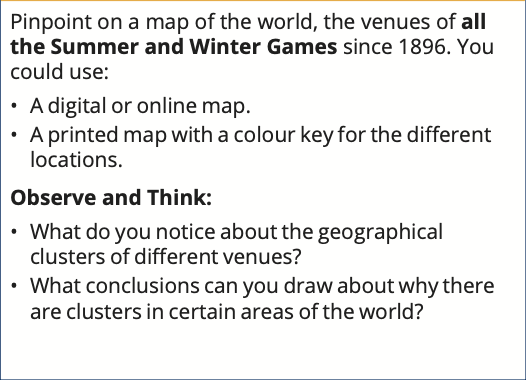
Session 2: Design a Logo
Session 3: Weekly & Kahoot Quiz
-
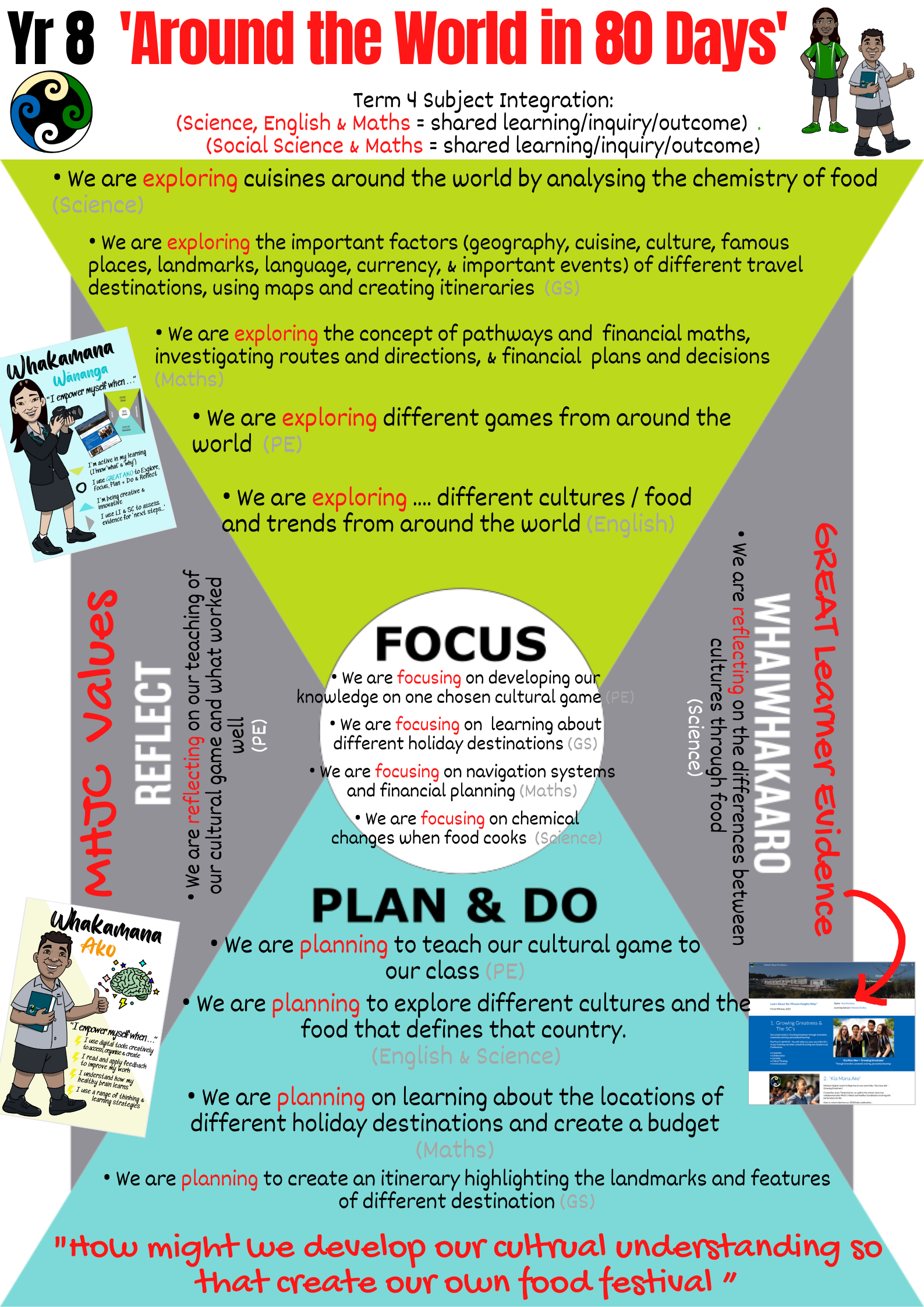
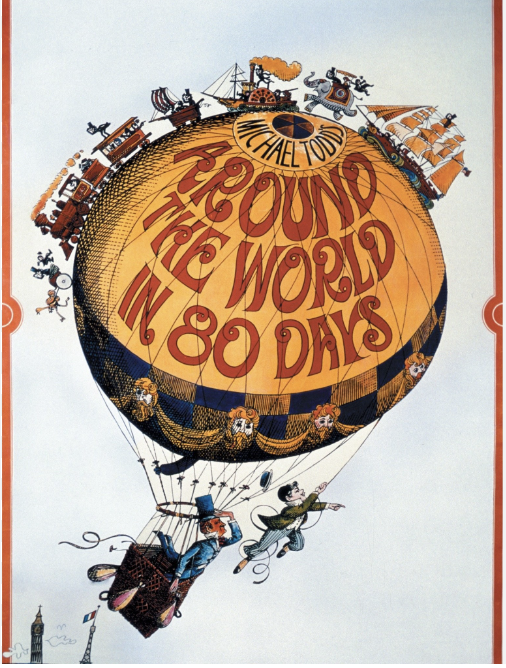
EXPLORE / TŪHURA learning intentions:
- We are EXPLORING important factors (geography, cuisine, culture, famous places, landmarks, language, currency, & important events) of different travel destinations.
- We are EXPLORING the legal documents needed for travelling other countries.
- We are LEARNING to create the map using FACKTS
• To design a google site showcasing various travel destinations.
Theme: Resilience/empowerment/perseverance
Whakatauki: "I orea te tuatara ka patu ki waho."
Metaphorical: A problem is solved by continuing to find solutions
Literal: This whakatauki refers to the need for creative thinking, adaptability and perseverance. In order to solve a problem you need to have all of these.Success Criteria: I can...
- use maps to highlight different destinations and landmarks
- create itineraries
- fill forms and complete legal procedures as required by different countries
- analyse the information and create a google site showing different travel destinations
- synthesise the information to create a blog.
Class Activities:
Session 1: Why do we need a passport?
Session 2: Create a passport.
Session 3: Weekly quiz - Create Itinerary -


EXPLORE / TŪHURA learning intentions:
- We are EXPLORING important factors (geography, cuisine, culture, famous places, landmarks, language, currency, & important events) of different travel destinations.
- We are EXPLORING the legal documents needed for travelling other countries.
- We are LEARNING to create the map using FACKTS
• To design a google site showcasing various travel destinations.
Theme: Resilience/empowerment/perseverance
Whakatauki: "I orea te tuatara ka patu ki waho."
Metaphorical: A problem is solved by continuing to find solutions
Literal: This whakatauki refers to the need for creative thinking, adaptability and perseverance. In order to solve a problem you need to have all of these.Success Criteria: I can...
- use maps to highlight different destinations and landmarks
- create itineraries
- fill forms and complete legal procedures as required by different countries
- analyse the information and create a google site showing different travel destinations
- synthesise the information to create a blog.
Class Activities:
Session 1: Tourism - Global Issues & Continue Part 2 (Around the world in 80 days)
Session 2: Tourism in the past & Continue Part 2 (Around the world in 80 days)
Session 3: Weekly quiz - Continue Part 3 - Google site -


EXPLORE / TŪHURA learning intentions:
- We are EXPLORING important factors (geography, cuisine, culture, famous places, landmarks, language, currency, & important events) of different travel destinations.
- We are EXPLORING the legal documents needed for travelling other countries.
- We are LEARNING to create the map using FACKTS
• To design a google site showcasing various travel destinations.
Theme: Resilience/empowerment/perseverance
Whakatauki: "I orea te tuatara ka patu ki waho."
Metaphorical: A problem is solved by continuing to find solutions
Literal: This whakatauki refers to the need for creative thinking, adaptability and perseverance. In order to solve a problem you need to have all of these.Success Criteria: I can...
- use maps to highlight different destinations and landmarks
- create itineraries
- fill forms and complete legal procedures as required by different countries
- analyse the information and create a google site showing different travel destinations
- synthesise the information to create a blog.
Class Activities:
Session 1: Marae Visit
Session 2: Weekly Quiz & Tourism in the past & Continue Part 2 (Around the world in 80 days)
Session 3: Athletics Day -


EXPLORE / TŪHURA learning intentions:
- We are EXPLORING important factors (geography, cuisine, culture, famous places, landmarks, language, currency, & important events) of different travel destinations.
- We are EXPLORING the legal documents needed for travelling other countries.
- We are LEARNING to create the map using FACKTS
• To design a google site showcasing various travel destinations.
Theme: Resilience/empowerment/perseverance
Whakatauki: "I orea te tuatara ka patu ki waho."
Metaphorical: A problem is solved by continuing to find solutions
Literal: This whakatauki refers to the need for creative thinking, adaptability and perseverance. In order to solve a problem you need to have all of these.Success Criteria: I can...
- use maps to highlight different destinations and landmarks
- create itineraries
- fill forms and complete legal procedures as required by different countries
- analyse the information and create a google site showing different travel destinations
- synthesise the information to create a blog.
Links
Class Activities:
Session 1: Create Itinerary - Activity
Session 2: Continue Part 2 (Around the world in 80 days Task)
Session 3: Weekly Quiz and Introduction to Part 3 (Around the world in 80 days Task) -


EXPLORE / TŪHURA learning intentions:
- We are EXPLORING important factors (geography, cuisine, culture, famous places, landmarks, language, currency, & important events) of different travel destinations.
- We are EXPLORING the legal documents needed for travelling other countries.
- We are LEARNING to create the map using FACKTS
• To design a google site showcasing various travel destinations.
Theme: Resilience/empowerment/perseverance
Whakatauki: "I orea te tuatara ka patu ki waho."
Metaphorical: A problem is solved by continuing to find solutions
Literal: This whakatauki refers to the need for creative thinking, adaptability and perseverance. In order to solve a problem you need to have all of these.Success Criteria: I can...
- use maps to highlight different destinations and landmarks
- create itineraries
- fill forms and complete legal procedures as required by different countries
- analyse the information and create a google site showing different travel destinations
- synthesise the information to create a blog.
Links
Class Activities:
Session 1: Longitude & Latitude - Activity
Session 2: Continue Part 3 (Around the world in 80 days Task)
Session 3: Weekly Quiz and Continue Part 3 (Around the world in 80 days Task) -


EXPLORE / TŪHURA learning intentions:
- We are EXPLORING important factors (geography, cuisine, culture, famous places, landmarks, language, currency, & important events) of different travel destinations.
- We are EXPLORING the legal documents needed for travelling other countries.
- We are LEARNING to create the map using FACKTS
• To design a google site showcasing various travel destinations.
Theme: Resilience/empowerment/perseverance
Whakatauki: "I orea te tuatara ka patu ki waho."
Metaphorical: A problem is solved by continuing to find solutions
Literal: This whakatauki refers to the need for creative thinking, adaptability and perseverance. In order to solve a problem you need to have all of these.Success Criteria: I can...
- use maps to highlight different destinations and landmarks
- create itineraries
- fill forms and complete legal procedures as required by different countries
- analyse the information and create a google site showing different travel destinations
- synthesise the information to create a blog.
Links
Class Activities:
Session 1: Coat of Arms - Introduction and Activity
Session 2: Coat of Arms - Continue
Session 3: Weekly Quiz and Continue Part 3 (Around the world in 80 days Task) -


EXPLORE / TŪHURA learning intentions:
- We are EXPLORING important factors (geography, cuisine, culture, famous places, landmarks, language, currency, & important events) of different travel destinations.
- We are EXPLORING the legal documents needed for travelling other countries.
- We are LEARNING to create the map using FACKTS
• To design a google site showcasing various travel destinations.
Theme: Resilience/empowerment/perseverance
Whakatauki: "I orea te tuatara ka patu ki waho."
Metaphorical: A problem is solved by continuing to find solutions
Literal: This whakatauki refers to the need for creative thinking, adaptability and perseverance. In order to solve a problem you need to have all of these.Success Criteria: I can...
- use maps to highlight different destinations and landmarks
- create itineraries
- fill forms and complete legal procedures as required by different countries
- analyse the information and create a google site showing different travel destinations
- synthesise the information to create a blog.
Links
Class Activities:
Session 1: Flags of Aotearoa New Zealand - Introduction and Activity
Session 2: Part 4 (Around the world in 80 days task)
Session 3: Weekly Quiz and Continue Part 4 (Around the world in 80 days Task) -


EXPLORE / TŪHURA learning intentions:
- We are EXPLORING important factors (geography, cuisine, culture, famous places, landmarks, language, currency, & important events) of different travel destinations.
- We are EXPLORING the legal documents needed for travelling other countries.
- We are LEARNING to create the map using FACKTS
• To design a google site showcasing various travel destinations.
Theme: Resilience/empowerment/perseverance
Whakatauki: "I orea te tuatara ka patu ki waho."
Metaphorical: A problem is solved by continuing to find solutions
Literal: This whakatauki refers to the need for creative thinking, adaptability and perseverance. In order to solve a problem you need to have all of these.Success Criteria: I can...
- use maps to highlight different destinations and landmarks
- create itineraries
- fill forms and complete legal procedures as required by different countries
- analyse the information and create a google site showing different travel destinations
- synthesise the information to create a blog.
Links
Class Activities:
Session 1: Around the World in 80 Days - Presentation
Session 2: Weekly Quiz and Presentation (Continue)
Session 3: Big Day Out -


EXPLORE / TŪHURA learning intentions:
- We are EXPLORING important factors (geography, cuisine, culture, famous places, landmarks, language, currency, & important events) of different travel destinations.
- We are EXPLORING the legal documents needed for travelling other countries.
- We are LEARNING to create the map using FACKTS
• To design a google site showcasing various travel destinations.
Theme: Resilience/empowerment/perseverance
Whakatauki: "I orea te tuatara ka patu ki waho."
Metaphorical: A problem is solved by continuing to find solutions
Literal: This whakatauki refers to the need for creative thinking, adaptability and perseverance. In order to solve a problem you need to have all of these.Success Criteria: I can...
- use maps to highlight different destinations and landmarks
- create itineraries
- fill forms and complete legal procedures as required by different countries
- analyse the information and create a google site showing different travel destinations
- synthesise the information to create a blog.
Links
Class Activities:
Session 1: Around the World in 80 Days - Presentation
Session 2: Presentation - Continue
Session 3: Prize Giving


